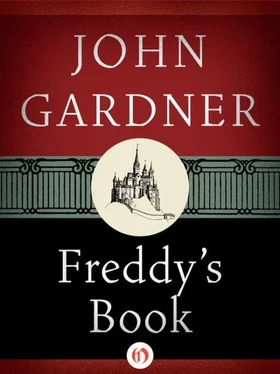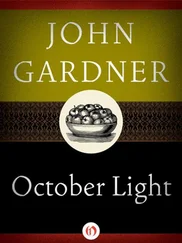“The hell you are!” Sören Norby yelled, leaping up onto his feet on the bed, the knife in his right hand, his left hand stretched out, fingers splayed wide, ready to fight.
“Hear my words, Sören Norby,” intoned the Devil, the sockets of his eyes staring emptily through the smoke. “Look down at this child beside me, this innocent torn from life!” Little by little, like the master illusionist he was, he revealed to Sören Norby’s horrified eyes the smoldering remains of the infant Sture who’d been exhumed and burned with Sten at Södermalm. The trick was so masterful, as it seemed to the Devil — and the pirate such a stupid and sentimental fool — it was all the Devil could do to keep from laughing. “Ah yes,” thought the Devil, “you swat them as a cow’s tail swats flies when they’re just a little older, but a poor dead infant — how the sight moves you!” Nonetheless he kept his face morose, his tone sepulchral. “Look on these ruins of my child and take thought on my second son Nils, who still lives! I make you his guardian and protector, Sören Norby, and in payment of your kindness I promise you this gift—”With a pass like a magician’s he showed a vision of his widow Kristina Gyllenstierna, stark naked on her pallet in her prison cell in Denmark.
“My lord,” breathed Sören, for the corpse of the infant and the nakedness of Sten Sture’s widow had persuaded him, “I am not worthy!” He sank to his knees and wiped his eyes with his forearm.
5.
FROM THAT MOMENT ON, Sören Norby was like a wildman in his support of the party of the Stures. He sent letters to Denmark, asking for an audience with King Fredrik, which he received. His plea for Kristina’s freedom was so impassioned that Kristina gave him a ring and said she hoped he would think of her as his dear, dear friend. As soon as he was back in Gotland he wrote more letters, one of them to Bishop Brask, telling him of his vision of Sten Sture’s ghost, and all that Sten Sture had said to him, and how he, Sören, had visited King Fredrik in Kristina Gyllenstierna’s behalf, and how the king had listened with interest. Now, to Sören Norby, Gustav Vasa was the Devil incarnate, renegade to the cause of Nils Sture, Sten’s son, and except for the love of Kristina Gyllenstierna, Norby desired nothing in the world with more ardor than he desired King Gustav’s fall. All this, too, he set down in his letter to Bishop Brask, with more in the same vein, and numerous expressions of his respect and good wishes for the bishop.
Bishop Brask held the letter at arm’s length, staring in disbelief.
“Bah, he’s a madman,” said the Devil, seated at the bishop’s elbow. With Brask he was by now so thoroughly comfortable that he made no effort to disguise his appearance, merely scaled it down so that it fit inside the room — hairy-rooted horns, face like an idiot’s, flesh soft and scaly as an enormous, fat snake’s. He sat with his dark, matted legs crossed, jiggling one hoof. His pitch-dark wings, when he half extended them, covered all the wall like a curtain.
“Not mad, I think,” said Bishop Brask irritably. “Misled, no doubt — no doubt by someone we know.” He said no more, at least nothing more aloud. It was true that the Devil could sometimes read one’s mind, that once he’d gotten into you there seemed to be no shaking him; but at least one could in some measure limit the monster’s conversation. That, thought Bishop Brask, was the real horror. Never mind the everlasting fire or the imps with forks. He could bore you, bore you to the ninth pit of madness, and think then of something still stupider, stupidity so deep it was unanswerable, a matter of awe, even terrible worship. Oh yes, Bishop Brask understood the Devil. Perhaps he could even outwit him, he sometimes thought, if he could summon up enough of his heart’s former warmth to make it worth it; but that was something he was in no mood to expect. It was a curious venom, the poison that flowed from the Devil. Say that all human life is idiotic, all human feeling an absurdity, effect without due cause; say that to weep at the death of one child after the deaths of a million million children — centuries of corpses, centuries of mothers gone berserk and wailing, each father turning sharply, heart leaping, at the voice he’s mistaken for his own dead child’s — say that all this is a shameful humiliation, an outrage not to be put up with; say that love and sorrow, considered from the peak of the mountain of eternity, are as paltry and insignificant as the wild, ravished hymning of blue-glinting flies on the four-day-old corpse of a mongrel. Say these things, yes, say all this once, thought Bishop Brask — say it once with conviction — and how are you to rise without revulsion to even the emotion of a heart-felt objection to the death you’ve just swallowed? Dry as a spider, the old bishop listened to the desiccate kiss of his rhetoric, the grotesquely chiming rhymes: conviction, revulsion, emotion, objection. How was he to feel anything worthy of even the debased coin “feeling,” he asked himself, limited forever to the predictable trapezoids of his mind’s drab spiderweb, language? Coin or coign, he thought, and furiously glanced at the Devil.
And so, in secret, in company with the Devil, he sailed to Visby, on the island of Gotland, stronghold of Norby and his pirates.
6.
SNOW FELL SOFTLY OVER THE SHIP and into the water. Sheets of ice, heavy with snow, lay all around him, and more snow lay heavily on the yardarms, the poop and the forecastle, the decks themselves. The sky was brilliant, so charged with light that only with one’s eyes closed to slits could one see anything at all. Bishop Brask, in a fur coat white with sticky snow, and a wide fur cap even whiter than his coat, stood gazing morosely toward the faint shadow he knew to be Gotland, in the distance. They seemed to be making no headway at all. For all he knew, they might the here, not that he cared. The Devil lay below, fuming and restless, eager that the ship get moving again. Bishop Brask, just now, had no time to think about the Devil. He was pondering a curious impulse that had come over him, an impulse so strong and so remarkable in its way that it seemed to him astonishing that nothing had come of it. In his cabin, an hour ago he had thought of writing a long letter to Lars-Goren Bergquist, a letter which would explain to the knight exactly what Bishop Brask thought of life and how it was that he had come to his opinions. He had written, with great firmness and elegance: To Lars-Goren Bergquist, Knight. Dear sir. Then he’d stared at the paper, as white and empty as the world around him now, and had struggled desperately to overcome his sense of the absurdity of the gesture, break past the thousands of reasons for saying nothing — the futility of expression, even will, the certainty that his words would be misunderstood or, if somehow understood, used against him, the firm knowledge that words, however elegant and true (if such things were possible), could hardly undo the past, that in any case Lars-Goren was his enemy, not his friend, and would have no choice, as servant of King Gustav, but to twist the words the instant he read them, lest his strength as an enemy be weakened.
The attempt to write had come to nothing, of course. It was not that fact that he brooded on now, but the odd fact that somehow, below reason and contrary to it, the childish impulse to tell the truth was still alive in him, that indeed he still believed, in some back part of his brain, that there existed some truth to tell.
“I was out of my mind,” he said, too softly for anyone to hear. He shuddered, thinking of the dangers he’d have opened himself up to if he’d written that letter. It was the Devil’s work, he thought; but at once his heart jerked back from that idea, though he could not, when he tried to think it through, make out why. Was it the miserable cold that had sent him this lunatic impulse, he wondered, or the universal whiteness that made nothing more important than anything else?
Читать дальше











